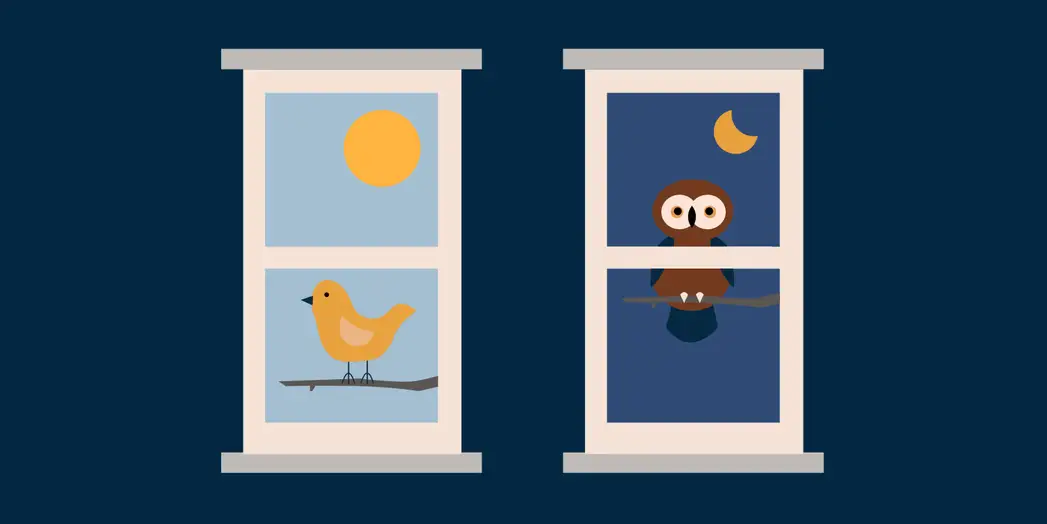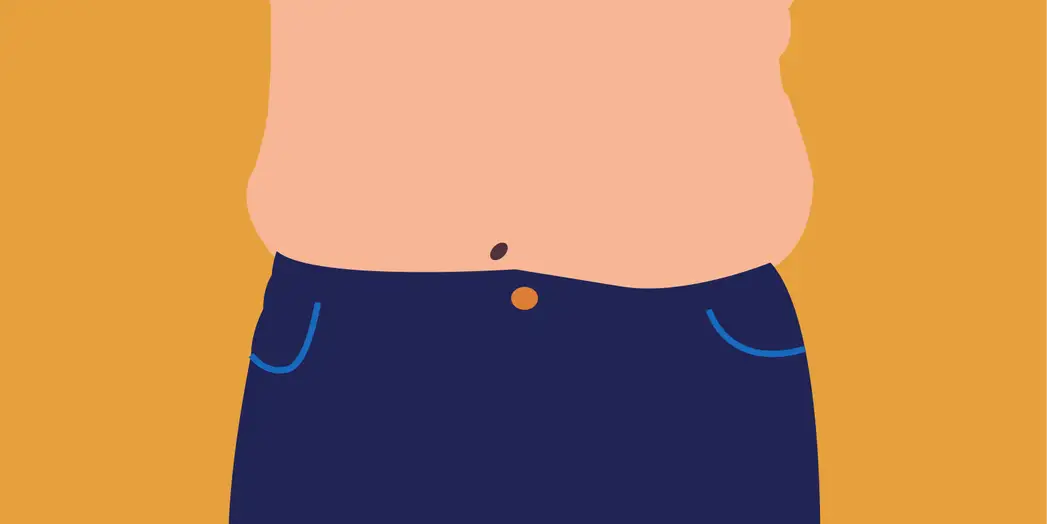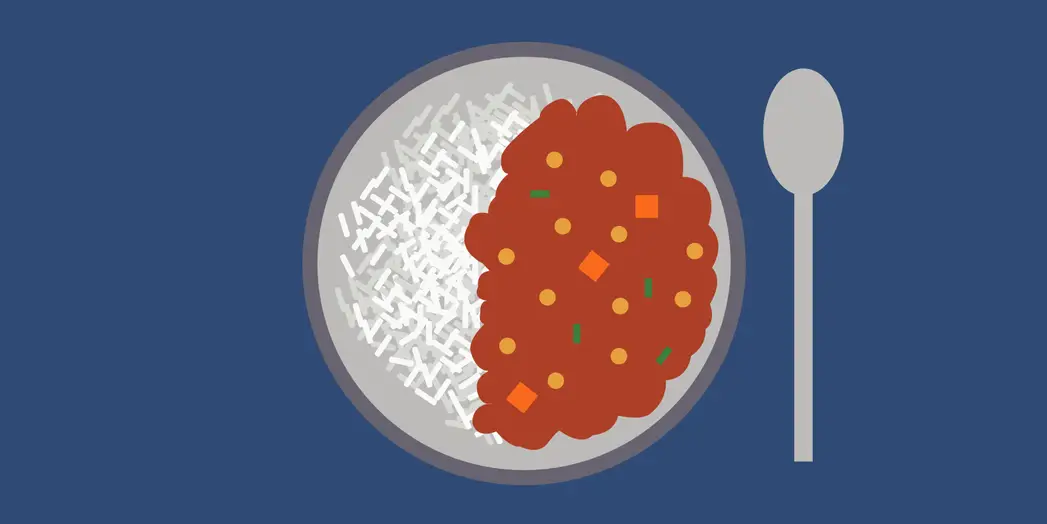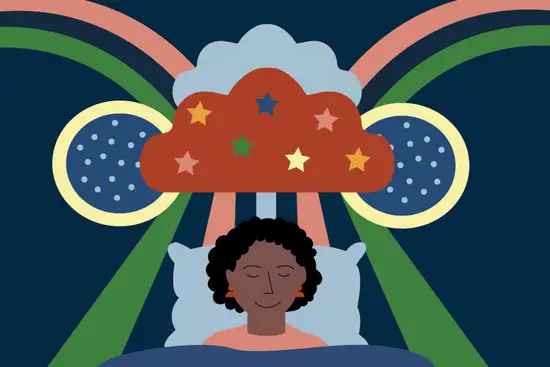Key points
After a full-on week, do you look forward to catching up on some shut-eye with a weekend lie-in? But could it be that your well-earned lie-in is actually doing more harm than good when it comes to sleeping well? This article will take a look at what happens when you shift your sleep patterns over the weekend and explain:
- what circadian rhythms are
- how your circadian rhythms are affected by shifting sleep patterns
- how shifting sleep patterns affect your mental and physical wellbeing
- what to do if you can’t get your sleep patterns back in sync.
Is it good or bad to sleep in at the weekend?
During a long and busy week, with many ups and downs, it’s all too easy to get less sleep than you need. You’ve probably been there, trying to balance work and home life and squeeze everything that needs doing into too few hours in the day.
This isn’t ideal, given how important sleep is to overall health and wellbeing.
Many of us try to compensate for sleep lost during the working week by sleeping in and waking up later on weekends.1
This strategy is often coupled with staying up later on weekends in an attempt to make the most of our free time.
The approach may sound good in principle — since you’re attempting to make up for lost sleep time — but is sleeping in at the weekend a good or a bad thing?
Let’s take a closer look.
Setting your body clock to weekend mode
Picture this: it’s morning and you’re just starting to stir. You rub your eyes and start to think about what you’ve got to get done during the day ahead. But wait… it’s the weekend! You turn over and sink back into bed, ready for another couple of hours’ sleep.
Is there really much harm in that?
Well, if you’re struggling to get the regular sleep you need during the week, then possibly yes.
The first thing to understand is that sleep and sleepiness are regulated by a set of chemical and physical changes that repeat across an approximate 24 hour cycle for most people.2 These include:
- changes in core body temperature which are associated with sleepiness and wakefulness
- fluctuations in melatonin (a hormone linked to sleepiness) — a higher melatonin concentration will make you feel sleepier
- variation in levels of human growth hormone which is vital for protein synthesis and body repair. 3 4
Any change that follows a daily rhythm (repeating over a 24 hour cycle) is said to be circadian from the Latin circa (“about”) and dies (“a day”).
You can think of these changes as being cogs in the body’s clock.5 The key thing is that many of these circadian rhythms (or cogs) need to be in sync with the times when you sleep and wake for you to feel at your best.
Circadian rhythms can be influenced by environmental cues. Light is the most important synchroniser of circadian rhythms in humans and your body is able to sense light even while your eyes are closed.
When your body first senses light in the morning it prompts a number of physical and hormonal changes linked to the start of the new day which can reset and synchronise the various circadian rhythms.
Genetic factors also influence circadian rhythms and can affect whether you’re naturally a morning person (a ‘lark’) or a night person (an ‘owl’).6 7

When we follow consistent sleep schedules (going to bed when we feel sleepy and getting up at the same time each morning e.g. for work on weekdays) most people will sleep and wake in line with their body’s circadian rhythms.
A good illustration of this is the act of waking up naturally at a time when the hormones that encourage wakefulness — like adrenocorticotropin and cortisol — are at their highest.8 In this instance you’ll probably wake up feeling alert and ready for the day ahead because your body has prepared you for it.
And when it comes to sleep, the best time for it is when melatonin and adenosine concentrations are raised in the body.9 This will vary from person to person and also seasonally but it’ll usually be when you start to feel sleepy. If you want to get the best sleep possible, don’t ignore that signal.
Problems set in if you start waking up and going to sleep at times that aren’t in sync with your circadian rhythms (e.g. trying to sleep when cortisol levels are high or trying to wake up with elevated melatonin levels).6 7
It’s unlikely that anyone outside a research setting does this intentionally but this is what happens after you stay up late at night and wake up later in the day. This is pretty typical for a lot of us when the weekend rolls around. We’ll enjoy a Friday evening out, or watching your favourite show late on a Saturday night.
It can also happen when going to bed and waking up earlier than usual, such as on a Sunday night when you think a nice early night will ready you for the week ahead. We’ll explore why this happens next.
Are your sleep patterns out of sync?
If you find it impossible to sleep at night but then can’t keep your eyes open during the day, our clinically-proven sleep therapy could help you get your sleep back on track. Using scientifically-validated methods and supported by a team of sleep experts, coaches and therapists, we’ll guide you back to sleeping well in as little as four weeks.
What happens if you sleep in on weekends?
If you follow a different sleep schedule on weekends, compared to weekdays, then it’s very likely that you’ll be exposing yourself to light and dark at times when your body isn’t expecting it.10
These changes in the timing of light and dark exposure force a reset of your circadian rhythms and your body starts to switch over to follow your ‘weekend’ schedule. If you’re going to bed later and getting up later it’s likely that:
- hormones like melatonin and adenosine, which make you feel sleepy, will increase in concentration later than usual at night
- hormones like adrenocorticotropin and cortisol, which make you feel alert, will increase in concentration later in the day
- metabolic processes will be shifted to the weekend schedule.
These changes wouldn’t be problematic if the shift to the ‘weekend’ sleep schedule was to be applied for the long-term.
But they can become troublesome when you want your body to revert back to the ‘weekday’ sleep schedule when Monday comes around. What happens then? Let’s find out.

Dancing to the (wrong) circadian rhythm
Most people who work Monday to Friday will go to bed earlier on Sunday nights compared to Friday and Saturday nights to get ready for the busy week ahead.
This is why Sunday nights tend to be the worst night for sleep. All of the hormonal and physical signals that encourage sleep aren’t yet at their peak at the time you’re getting into bed, leading to difficulty in getting to sleep.2
When you lie in at the weekend, signals to wake up are also delayed and this can produce that groggy Monday morning feeling. If you regularly use the weekend to ‘catch up’ on lost sleep then you’re less likely to start the week as fresh as you could have if you’d preserved your ‘weekday’ sleep schedule across the weekend.
There are several other background processes (like those belonging to metabolism and organ function) which follow a circadian rhythm of their own but are linked to those belonging to sleep. This means that it’s important for them to be in sync with the circadian rhythms that influence your sleep if you’re to benefit from them fully.
This isn’t possible if your sleep and wake times are always changing.
Although the data is conflicting on how serious the implications of this are, it’s probably a good idea to maintain consistent sleep and wake times — even at the weekend.11 12 13
Why is this? Let’s take a closer look.

Mental effects of a shifting sleep pattern
Reverting back to a ‘weekday’ pattern after following a ‘weekend’ sleep schedule has been associated with lower mood (greater feelings of tension, anxiety and worry) and reduced brain power in the period shortly after waking, at the start of the working week.10 14 15
Research has shown that this can lead to:
- a slowing of mental arithmetic skills
- reduced alertness
- lowered ability to make mental connections (e.g. between words).10 11 15
This could explain why the Monday morning school run is always such a slog or that first meeting of the week can seem the hardest.

Physical effects of a shifting sleep pattern
Having lie-ins on weekends has also been shown to have a rather ironic effect. Instead of going into the following week fully rested, having ‘caught up’ on lost sleep, it seems that the shifts in circadian rhythms caused by weekend lie-ins actually increase feelings of daytime sleepiness!12 16 17
This has been tied to the observation that those who have more irregular sleep patterns tend to need more sleep overall and are more prone to falling asleep spontaneously.18
So, if you’re finding that you’re tired through much of the week despite getting enough sleep, it might be worth considering making your bed and wake times more regular.
A more concerning observation is the link between shifts in ‘weekday’ and ‘weekend’ sleep and wake times and the risk of developing metabolic syndrome — a combination of obesity, diabetes and high blood pressure.19 20
It isn’t clear whether this is down to disruptions in circadian rhythms or simply meal timing and diet fluctuations on account of changes in sleep. But a similar observation has been made of shift workers who need to use their weekends to adjust to the following week’s shift pattern.

What does this all mean?
We know that getting enough sleep is key to a long, happy and healthy life. But you may not have thought about the importance of when you get that sleep. Ideally, it should be at the same time every day so that you’re always falling asleep and waking up at your best.
An added benefit of thinking a bit more about when you go to bed and wake up is that it may prompt you to think about other lifestyle choices that you’re making, such as your:
However, if being more consistent with your bed and wake times comes at the expense of time spent asleep (e.g. if a late night leading to a lie-in is unavoidable or you work shifts) you shouldn’t restrict your sleep just to be more consistent in your sleep and wake times.
In fact, if you’re sleeping in at the weekend as that’s the only way you can ensure that you’ll get enough sleep for your needs, then it might actually help you live longer.1 22
But if you feel your sleeping pattern is entirely out of control, Sleepstation can help.
Sleepstation can help you sleep well, week-in and week-out
Sleepstation’s digital sleep clinic has been providing highly-effective support for people with even the most severe sleep problems for well over a decade. Combining Cognitive Behavioural Therapy for insomnia (CBTi), the gold standard approach for insomnia treatment, with empathetic human support, we’ll get to the root of your problem and equip you with the tools to take back control of your sleep long-term.
Over the course of your therapy, you’ll learn practical steps to adapt your sleep patterns and behaviours, making sure you’re fully equipped to manage your own sleep, both now and in the future.
Whether you want to improve your sleep so that you’re ready to hit the ground running come Monday morning, or you’ve found yourself stuck in an unhealthy sleep pattern that you just can’t break, let us help.
To get started, just tell us a little about you and your sleep in our short sleep quiz and take the first steps to sleeping consistently better.
Summary
- Human sleep is governed by a set of physical and chemical changes that repeat across an approximate 24 hour period in what are referred to as ‘circadian rhythms’.
- For optimal sleep, your bed and wake times need to be synchronised to your circadian rhythms.
- Staying up and waking up late at weekends causes a shift in these circadian rhythms.
- This compromises sleep quality when you need to revert to an earlier bed and wake time for the week ahead.
- It’s important to get enough sleep and to also be consistent, getting up at about the same time each day and only getting into bed when you’re feeling sleepy.
References
- Spiegel K, Leproult R, Van Cauter E. Impact of sleep debt on metabolic and endocrine function. Lancet 1999; 354: 1435–1439. ↩︎
- Taylor A, Wright HR, Lack LC. Sleeping-in on the weekend delays circadian phase and increases sleepiness the following week. Sleep Biol Rhythms 2008; 6: 172–179. ↩︎
- Harding EC, Franks NP, Wisden W. The temperature dependence of sleep. Front Neurosci 2019; 13: 336. ↩︎
- Van Cauter E, Copinschi G. Interrelationships between growth hormone and sleep. Growth Horm IGF Res 2000; 10: S57–S62. ↩︎
- Xie Y, Tang Q, Chen G, Xie M, Yu S, Zhao J et al. New insights into the circadian rhythm and its related diseases. Front Physiol 2019; 10: 682. ↩︎
- Taillard J, Philip P, Bioulac B. Morningness/eveningness and the need for sleep: Morningness/eveningness and the need for sleep. J Sleep Res 1999; 8: 291–295. ↩︎
- Vink JM, Groot AS, Kerkhof GA, Boomsma DI. Genetic analysis of morningness and eveningness. Chronobiol Int 2001; 18: 809–822. ↩︎
- Born J, Hansen K, Marshall L, Mölle M, Fehm HL. Timing the end of nocturnal sleep. Nature 1999; 397: 29–30. ↩︎
- Arendt J, Skene DJ. Melatonin as a chronobiotic. Sleep Med Rev 2005; 9: 25–39. ↩︎
- Yang C-M, Spielman AJ. The effect of a delayed weekend sleep pattern on sleep and morning functioning. Psychol Health 2001; 16: 715–725. ↩︎
- Bonnet MH, Alter J. Effects of irregular versus regular sleep schedules on performance, mood and body temperature. Biol Psychol 1982; 14: 287–296. ↩︎
- Valdez P, Ramírez C, García A. Delaying and extending sleep during weekends: sleep recovery or circadian effect? Chronobiol Int 1996; 13: 191–198. ↩︎
- Irish LA, Kline CE, Gunn HE, Buysse DJ, Hall MH. The role of sleep hygiene in promoting public health: A review of empirical evidence. Sleep Med Rev 2015; 22: 23–36. ↩︎
- Takasu NN, Takenaka Y, Fujiwara M, Toichi M. Effects of Regularizing Sleep-Wake Schedules on Daytime Autonomic Functions and Psychological States in Healthy University Students with Irregular Sleep-Wake Habits: Irregular vs. Regular Sleep-Wake Rhythm. Sleep and Biological Rhythms 2012; 10: 84–93. ↩︎
- Taub JM, Berger RJ. Performance and mood following variations in the length and timing of sleep. Psychophysiology 1973; 10: 559–570. ↩︎
- Sleep health & scheduling. Sleepfoundation.org. Available here. (accessed 18 Sep2023). ↩︎
- Kang J-H, Chen S-C. Effects of an irregular bedtime schedule on sleep quality, daytime sleepiness, and fatigue among university students in Taiwan. BMC Public Health 2009; 9: 248. ↩︎
- Manber R, Bootzin RR, Acebo C, Carskadon MA. The effects of regularizing sleep-wake schedules on daytime sleepiness. Sleep 1996; 19: 432–441. ↩︎
- Gaultney J. Weekend-weeknight shifts in sleep duration predict risk for metabolic syndrome. J Behav Health 2014; 3: 169. ↩︎
- Metabolic syndrome. nhs.uk. Available here. (accessed 18 Sep2023). ↩︎
- Duncan MJ, Kline CE, Rebar AL, Vandelanotte C, Short CE. Greater bed- and wake-time variability is associated with less healthy lifestyle behaviors: a cross-sectional study. Z Gesundh Wiss 2016; 24: 31–40. ↩︎
- Åkerstedt T, Ghilotti F, Grotta A, Zhao H, Adami H-O, Trolle-Lagerros Y et al. Sleep duration and mortality – Does weekend sleep matter? J Sleep Res 2019; 28: e12712. ↩︎


